Paths Crossed: Mark McInnis
The surf photographer on surrendering to the ebbs and flows of a creative life.
It’s wild to think back to the intrepid times of fall 2020, when I’d push open the heavy door of my 2001 Dodge Ram to the misty morning hug of the Oregon Coast, to the smell of the Sitka spruces, and to an empty parking lot in Pacific City, Oregon, save for a few well-worn fishermen. The magic of this coastline—the sea stacks, the moss, the mud—is rivaled only by the community of cold-water surfers and creatives I met by spending that time in my safe haven.
It was on the beach that I met photographer Mark McInnis. Mark’s open, optimistic spirit was outsized, and he immediately felt familiar, like an old friend I’d known for decades. We chatted away, laughed a lot—and yet I knew that this was a man who had lost his home to a wildfire just days before, as I’d happened to see the outdoor community rallying around him via a social media fundraiser. The wildfires that were ravaging Oregon that September—the most destructive season on record until this year—were also my reason for an escape to the coast that week, the smoke around Portland unrelenting.
I still have a deeply held space in my heart for the Oregon Coast, and that I share with Mark. The surfer, based in Bend, Oregon, spends much of his time by the ocean, a place intrinsic to every part of his story both personally and professionally. It was a pleasure to sit down and talk in greater detail about Mark’s path, the trajectory of a photography career, and about how to make sense of the things in life when there’s no sense to be made, surrender being a big part of riding the waves.
We also talk about the wild places the camera has taken Mark, namely the remote Pribilof Islands off the coast of mainland Alaska. Two short films directed by Ben Weiland—Island X, and this fall’s Return to the Bering—follow Mark and company to this group of volcanic islands to chase undiscovered waves. The footage is beautiful, as is the far greater imprint left by the resilient communities who make these adventures what they are.
How would you introduce yourself?
I'm a professional photographer in the commercial outdoor space. I cut my teeth in surf photography in the Pacific Northwest. And that led to shooting for surf brands, as well as shooting for more commercial outdoor clients.
Were you always a surfer?
I fell in love with the ocean at a super young age. My parents met in Maui, though they are both originally from Seattle. When they found out they were pregnant with me, they wanted to be closer to family, but didn’t want to be in the rain. So they moved to Bend, where I was born and raised. But they split when I was two, and my dad went straight back to Maui. So my mom was putting me on planes at a super young age, and I would go over and stay with my dad for a few months a year. I didn’t start getting in the water and surfing until I was 15, and didn’t really get passionate about it until I was 20. And then my dad died when I was 23 and that’s when I decided surfing would be such a beautiful way to honor his spirit and carry him with me. He was my surfing buddy, the person I would surf with more than anybody up to that point. So I began surfing all across Oregon and Washington, and then started taking my board and going on actual surf trips.
Losing your dad is pivotal in and of itself, but he also died while surfing. Are you okay with talking about it?
For sure, it's a pretty essential part of my story. My dad died from a shark attack.
I’d imagine that would be enough to make someone else shut down and never go back into the water. Given the life that he led, do you think in some way your dad would find it poetic that a shark took him out.
He would love it. And the thing about the shark attack is that as gruesome and as gnarly as people probably think it is—and it is, it's very primal—to me, it was a beautiful end to a beautiful life because he was a waterman through and through. He lived in the ocean. He was always on the beach. Fishing, surfing, diving, scuba diving, metal detecting. He was just a trippy, awesome human. And while I know that he was scared of sharks, we talked about it, it's cool too because in Hawaiian culture, they believe that the ancestral spirits, the ‘aumakua, could take possession of an animal, a shark, for a particular reason. So in that way, at my dad's funeral, a Hawaiian uncle—the locals of Hawaii considered my dad one of their own—took me aside and told me if a shark comes and takes you, it means that it’s taking you home.
I like that.
So now every single time I'm walking on the shoreline or into the water—it never fails—I'm talking to him. It's almost like a mantra or a prayer, an acknowledgement of why I’m going out in the water. It’s always something like: Thank you so much for teaching me about the ocean and helping me foster a love for the ocean and teaching me to surf. I'll catch a wave for you.
What were your first steps toward a career in photography? Was it a deliberate choice?
I graduated college with a degree in journalism with a focus on advertising and communications from the University of Oregon in 2007. I then spent a year in Hawaii just being a surf bum and working odd jobs before moving to Portland. My stepdad, who was like a father to me as well—I don't even like that word stepdad, I had two incredible fathers—was a hyper-intelligent business guy, a go-getter. So he and my mom were like, Okay, you're back in Portland, it's time to start your career. I’d started college two years late so by this point I was 27.
That’s interesting, getting the blend and influences of the free-spirited dad and the business-minded dad.
For sure. They have shaped my life, but my mom has had the biggest hand in that because she has the most incredible taste in men. She has always chosen men that are father figures for me, that love me as much as her. I owe her a lot of gratitude for that. So yes, here I am back interviewing at all these ad agencies. People were playing ping pong and foosball and drinking beer, like no cubicles—it was all very creative and cool. I would leave those interviews feeling super stoked, but all I could think was that I'm still going to be working for somebody else. I’m going to be married to this office every day. And my life up until that point had always been so free. So I was going through this super intense internal struggle: Do I make my parents happy? They've been so supportive. They've done everything for me my whole life. I don't want to let them down. But at the same time, I just don't feel this in my heart. It's not what I want to do at all.
I still remember how empowering it was in my mid-twenties to make some of my first decisions outside the gentle, practical advice of my dad to line up my next job before leaving a current one. I took a leap and figured it out as I went.
For me, I'd had this passion for photography since my junior year in high school, and always had a camera with me, documenting everything. These were the days of Craigslist, so I was putting ads up on Craigslist with a bunch of photos I'd taken. It was actually a terrible tactic now that I think about it, because it would have been better to just focus on one thing. But I started getting these weird little jobs that were getting me by. Like going to a giant warehouse and photographing imported, life-size carvings of Serengeti animals—elephants, lions, giraffes. And then one day I was out on the coast to surf, and it was a little out of my league, it was pretty big but the conditions were perfect, so beautiful. I started taking pictures, and I got them home that night and put them on the computer and was editing them. And it just clicked. I was like, This is it. I'm going to be a surf photographer. I'm going to document the Pacific Northwest.
I love those stories. Paying attention to what you’re doing when time has suddenly disappeared is a clue to what matters to you. So many people might shoo away that thought that sparked, or decide it’s not tenable. Where did you go with that conviction?
My stepdad Tom always wrote on these yellow legal pads. He gave me a stack of them, so I had my pad and pen and went on the internet into the wee hours of the morning going through every surf photographer's website. In the back of my mind, I was going to have this huge list of people to reach out to. There were some incredible photographers, but the more I went, the more that so much of their work lookd alike. It all started to blur, and when I was done with my dive I had two names on the list: Chris Burkard from Central California and Jeremy Koreski from Canada. So I reached out to both of those guys introducing myself and saying I'd like to learn from them. They both replied. But Chris was like, Hey, dude, funny timing. My wife and I were just talking about how I should start this tutorial thing, do you want to be the first person? He’s like, Just come down here and give me 100 bucks a day, stay as long as you want. So I think it was the next week already that I drove down to the San Luis Obispo area, where Burky’s from, and gave him 300 bucks, stayed for three days and just got a wealth of knowledge.
That’s awesome. I had totally forgotten about that connection. I asked him to do a little Q&A for a magazine I worked for and he did—he’s really generous. I love this moment of alchemy for you. People ask me how to get into publishing, and I wish I had better answers because it’s often more about relationships in these creative jobs, referrals versus posted jobs. But I always tell people that it never hurts to reach out to people you admire, to look up your favorite presses and publications.
This was before Chris became the force he is now, he was still very much the surf photographer, and was just starting to win some awards. He gave me a huge list of contacts in the surf industry, and was just super generous and open, and, yeah, we've had an amazing relationship ever since. I credit him for a lot of my success in life. In 2016 he was shooting with that climbing lifestyle brand Prana in Iceland and he needed a second lead shooter. So I did that. And then, long story short, Prana became a one-on-one client of mine. I think that Prana work and that portfolio was like instant credibility, working with a brand that big and doing three shoots a year with them for five years.
I hear that. I took a pay cut to go to Random House in 2010 because I felt it was my chance to pivot from medical publishing into more creative surroundings, and that the name recognition was going to help me build from there, which it did. In the work, do you have an absolute favorite surf photo and why?
From 2016 to 2018 I was working with another group of friends on a project up in Alaska at this wave that my buddy has been going to for 30 years. He got the cover of Surfer magazine at this wave back in 1998, I think it was. And he'd been going back every year since to try and get it. But it's a very fickle place. It doesn't always break. And then during those years, it was just very, very good again. So we went up there and scored a few times and documented the whole thing. And I ended up getting the cover of Surfer for it in 2019. There are these crazy mountains in the background. It was a crystal-clear day, and the waves were absolutely pumping. It’s just you and your buddies on the beach. There's nobody there. It was one of those moments where you're like, How did this all come together? And then getting the cover of Surfer was a dream come true, to get in there a year before they went defunct.
How are things going right now for you? Would you still never trade the freedom for the structure? I’m curious as someone who has been a freelancer since 2011, and who knows my freedom is a blessing, absolutely, but can also be a bit of a curse.
I hate structure. I have no room in my life for it. Life is meant to be lived, and that can mean a lot of different things to different people. But to me, that means being in 100 percent control of my time. And that may sound selfish, but that's just how I want to live. I want to do what I want to do. I don't want to do what somebody else tells me to do, or that I’m required to do every day for a paycheck. But that works for a lot of people too. And a lot of people would look at what I do and they'd be like screw that. But 2024 has been one of the slowest years of my career. It's been gnarly. I bought this house in February, and was like, Cool, I’ll dump a lot of my savings account into it because my busy season is about to come up, and I'll replenish it like that. And then I had one job in April. I don't know if it was the election year, people trying to figure out what the economy is going to do. I've had some things come through last minute that have been game changers, and I have a lot already booked for the first 3 months of 2025, so I feel like it's going to get back on track.
There’s the roller coaster, the ebb and flow.
Exactly. I had some massive years shooting commercial work where I was doing my taxes, thinking, Whoa, this is insane, I never thought I'd make this much money in photography. And now in 2024 I've been like, Damn dude. I feel like it's 2008 again, where I'm grinding, making decks, sending them to clients, pitching myself. But honestly, you know what? Back in those days, in 2008, I had a tiny studio at the coast, I had a fridge full of Budweiser and a freezer full of pizzas, and it was the happiest I'd ever been in my entire life. I have more financial responsibility now, but going back to that grindy, hustle mindset, it's been kind of fun. Everything's a learning experience, right? If you're willing to learn. And I just have faith that everything will work out. It’s always in those moments where I feel like my career is nosediving into the ground that I get an email where someone's like, Hey, what are you doing in March?
I’ve had that happen too—just when I’m starting to feel a bit low, someone comes out of the woodwork about a job! It’s funny, I’ve been in a very similar boat recently, where I’ve had to put myself out there again. I’ve been fortunate enough in my freelance career—writing and copyediting and proofing and production management—to flow from referral to referral to the next steady job to the next. I didn't have to apply for a job for more than 10 years and then suddenly, in the last couple years, it was like, shit, I don't even have a resume. But it keeps you on your toes, shakes things up.
Yes, I feel like I've learned a lot through this year about not counting your eggs before they hatch versus when you’ve gotten used to cruise control.
Island X, the documentary directed by Ben Weiland, was a big personal project of your last years. Tell me about the experience of Island X and what it’s all about.
So Island X is a story about the Pribilof Islands, St. Paul specifically, in the Bering Sea, the body of water that connects Alaska and Russia. These islands are up above the Aleutian Islands. The director of the films, Ben Weiland, is well known for doing surf projects in obscure places. There was a scientist named Jeremy up there who was studying the fur seal population, who’s from Seattle and is also a surfer. So he just started sending Ben photos, being like, Hey, I know you like really weird places with waves, you should come check this place out. And so Ben asked me if I’d be up for doing this. It was hard to say what was what, as photos can tell a million lies. But I was so down. We first went up in 2019 and made a little edit to show supporting brands. We got support from Arc'teryx, Hydro Flask, 10 Barrel Brewing, and others, and went up there in December of 2021, which was a year after my house had burned down. Ben, as a director who can see such things, said to me, Hey, I think we've got to marry these two stories.
I met you right after you lost your house during that terrible wildfire season in fall 2020. I took my van to the Oregon Coast for a few days to get out of the smoke in Portland. I wanted to ask you about this loss, because that's a gnarly one too. I remember talking to you on the beach and couldn’t imagine but hoped my sincerity came across that my heart went out to you.
Yeah, it was gnarly at the time. I lost years of work, a full body of work. And when the fire happened, I had been going through consistently and backing up all of my work of 15 years. I was planning to take one of the hard drives to a third-party site, take it to my mom's or put it in a gun safe at someone's house. I was probably a day or two away from being done. And I went on this backpacking trip when the house burned down. I've gotten bits and pieces back from clients. But I did a 3-week personal trip in Morocco, in Alaska, I shot surf photography, my biggest passion, in different parts of the globe, and lost all of those trips. So if I said that I'm over it, or that I'm ever going to be over it, I think I'd be lying, because I would give just about anything to have those images back. But at the end of the day, we come into this world naked with nothing, and we go out the exact same way. And so it doesn't really matter. It's just something that I wish that I still had. And besides that, my mom and her husband Don were there, and they got out safe and alive—Don being another living legend who my mom has been with since shortly after my (step)dad Tom died. And neither of our neighbors’ houses burned down, and they're both safe and alive. So things could have been much, much worse.
How do you make sense of the stuff that doesn't make sense? Like, we all just have to walk through this world and things will and do happen.
We surrender.
Ahh, I actually wrote down the word “surrender” in my notes. To ask you what your relationship is to surrender. Tell me more.
I think whether you are a religious person or a spiritual person or an atheist, I think we can all agree that there's something bigger than us, no matter what it is. Whether it's the universe or life or god, there's something that you just have to surrender to. And have faith in—whatever that faith may be—that you're exactly where you're supposed to be at this moment. Because it's all we have. We don't have yesterday, we don't have tomorrow. And so when all that stuff happens—my dad dying, my other dad dying, the house burning down, breakups, all this stuff that sucks and is so hard to get through—when we ask in our mourning and our grief, Why? Why? Why? There will never be an answer. And so you have to come to terms with that, no matter your belief system. Because what else are you going to do? Be miserable for the rest of your life? Be a woe-is-me person? No one wants to be that person and no one wants to be around a woe-is-me person. You want to survive, move forward, surrender.
That’s beautiful. So Island X comes out, and you and the team have since gone back, culminating in the follow-up film, Return to the Bering. It just had its American film premiere in San Diego and will go into the festivals. You sent it to me to screen, and just like Island X, I was transported to these remote but resilient places, barren islands with dune grass and volcanic black sand. I absolutely loved the footage of you all teaching the kids in the community to surf. Was there a particular objective in going back?
After Island X came out, it won all these awards, and we did all these film tours. But the original wave photo that we saw that took us up there—I think it's one of the best waves in the world on its day—we’ve never seen it break. So the impetus to go back was that it still felt a bit unfinished, we haven’t been able to showcase what’s really there. So we got grants from the state of Alaska, and the community of St. Paul helped us get those grants. We were able to bring the whole crew back together and go up there. We still didn't get that wave. But then we went over to St. George, the other populated island, and that was a whole other experience on a completely different level. It's a dying community. It's in one of the most beautiful places I've ever seen in my life, but it’s a struggle for those people to live there, it’s a miracle that anyone still does. A lot of the homes are already deserted. The fishing industry has been decimated, and it’s become harder to fish close to home, they have to keep going farther and farther out to sea to fish for crab or halibut.
More climate and commercial fishing fallout. Meanwhile, you are at the mercy of nature even getting there to tell their story.
Yeah, the flights are at the whim of the weather. It basically has to be perfect, which doesn't happen up there very often. In fact, it's worse in the summer because they get riddled with fog from the temperature over the water being really cold and the air a little warmer. But luckily the systems in winter are so strong that they'll blow in, move through, and then it'll clear up again. So you have to be flexible.
I was just going to say, you must thrive in this, the familiarity of an expedition-style trip. And it must also matter who is part of the team, if they can roll with it.
I love it. It's funny you say that because when we were on St. George, the flights were canceled. I think we had to stay an extra five days, or something like that. We couldn't get off the island, and I didn't want to get off the island, I just wanted to stay. Every time somebody would be bummed, I’d secretly be like yessss. So it is totally part of the expedition. It is so important about the crews and the people that you're with on those types of trips. You need to be comfortable that you can be with somebody for three weeks who isn’t going to freak out, who can weather the storm, literally and figuratively.
I’m in awe of watching people surf, period. Let alone this 40-degree (F) cold-water surf, but this is where you’re at home?
Yeah, but it's getting harder and harder to find nowadays. I'm lucky that I live in a place where I can surf alone, pretty much the entire time. But even that in Oregon is getting harder and harder to find. What always attracted me to cold-water surf was just the lack of humans. But lineups are getting crowded. Wetsuits are just too damn good these days.
So what’s next?
It's a weird moment. And what I've really been searching for in my brain and in my environments is what’s my next personal project. Because I love what I do. I love commercial work. I love my clients. My whole goal on set is to create long-lasting, important images for my clients, but also have fun. I don't take my work too seriously. But I haven't had a passion project now for a couple years, and my personal work is very important to me because it motivates me and keeps a camera in my hand even when I'm not doing the commercial work. Much like the accompanying Island X book I made, I also made a book called Upriver about the McKenzie River Valley, where I lost my house, with photos from before and after the fire. All film. So I'm excited to figure out what the next project will be because right now I have absolutely no idea.
What are you most proud of right now?
Man, that's a really good question.
Everybody pauses like this. I love it.
I think I inherited, whether through DNA or through experiencing it, my dad’s anger. My biological father was truly the most loving, caring, incredible human in the world. And he also had the nastiest temper ever. I used to kind of have that same temperament. It was never towards people, my dad would never get mad at people. But it was always situational, as was mine. So in 2021 I was just finally like, I don't think I need to live like this. Like, I don't think I need to be like this. I’d lose my mind and absolutely blow a fuse when I broke a glass in the kitchen. So I started going to therapy for it specifically, in 2021, and that entire side of me is pretty much gone. I have this amazing therapist, Katherine, to thank, who has been there for me through thick and thin. I am so proud that when I'm on the snowmobiles with my buddies and I get stuck that I don't blow a fuse. Or when I pull the milk out of the fridge and it slips out of my hand that I don't blow a fuse. Or if somebody at a stop sign in front of me is on their phone and not going and making me wait 15 seconds longer that I don't blow a fuse. I'm proud to say that I have left that part of my dad and myself in the past. That was a major hindrance on my life; I was always so embarrassed afterwards, and I always felt so bad and so guilty. I'm proud that my relationship with anger is healthy. Anger is a human emotion. Anger is not a problem. It's how you deal with that anger, how you release it.
Thanks for sharing that Mark, I love it. Really beautiful. And do you have a definition for adventure?
When I think of adventure, I think of going somewhere new and unexplored, and somewhere that I haven't been. But wow, how do I define adventure? This is almost harder than the what-are-you-proud-of question. It’s weird, because when I initially think about it, I think it's getting out of your comfort zone. But then I've also had adventures in places that I've been to multiple times, and I continue to go back to those places to seek the adventure that they offer. And I feel like it's almost better to invest in going back to places and going deeper in those places than it is to just skim the surface. We've been four times to the Pribilof Islands for Island X and Return to the Bering, and I just want to go back. To adventure deeper into something that's familiar for me, to find things that are unfamiliar in familiar places.


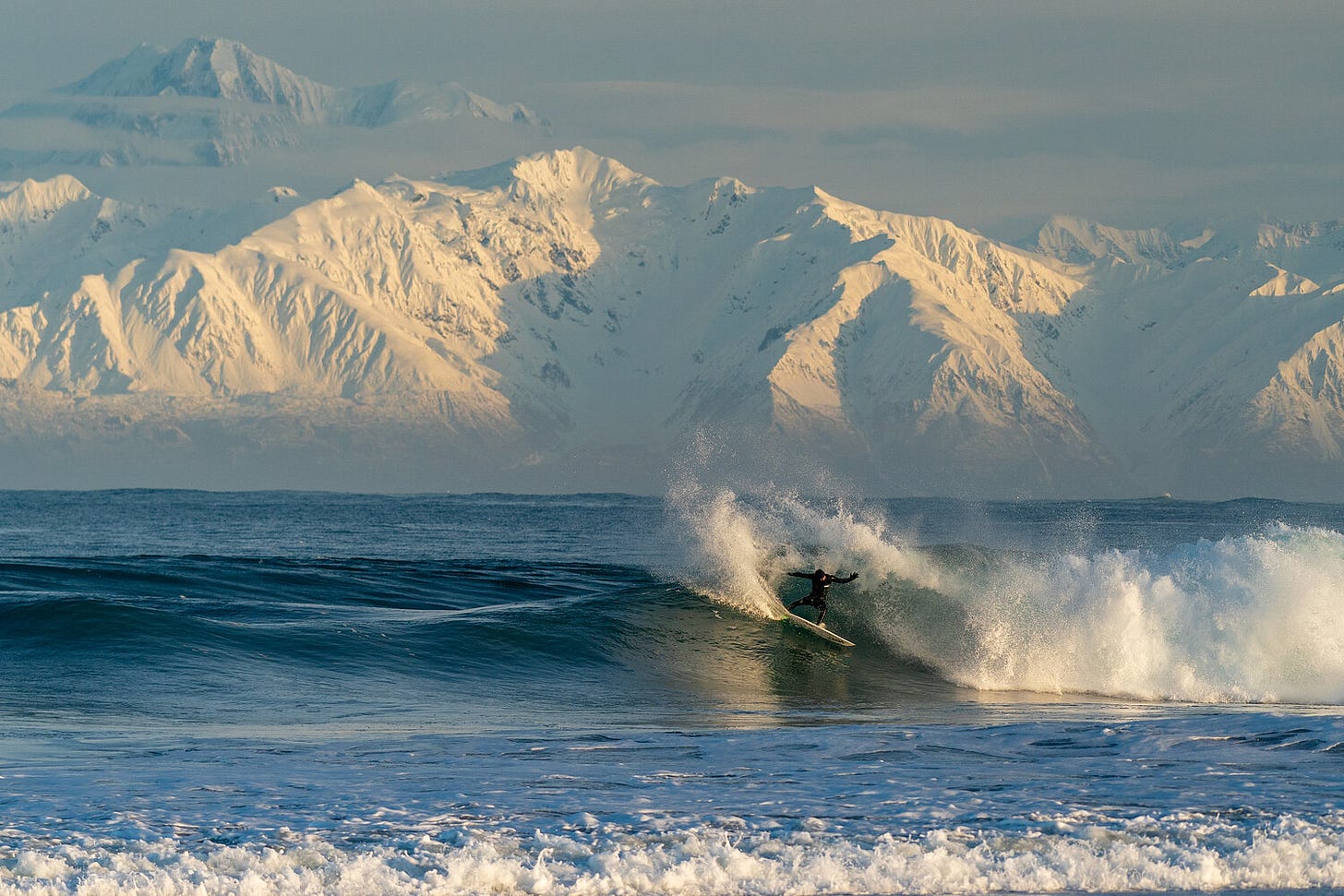
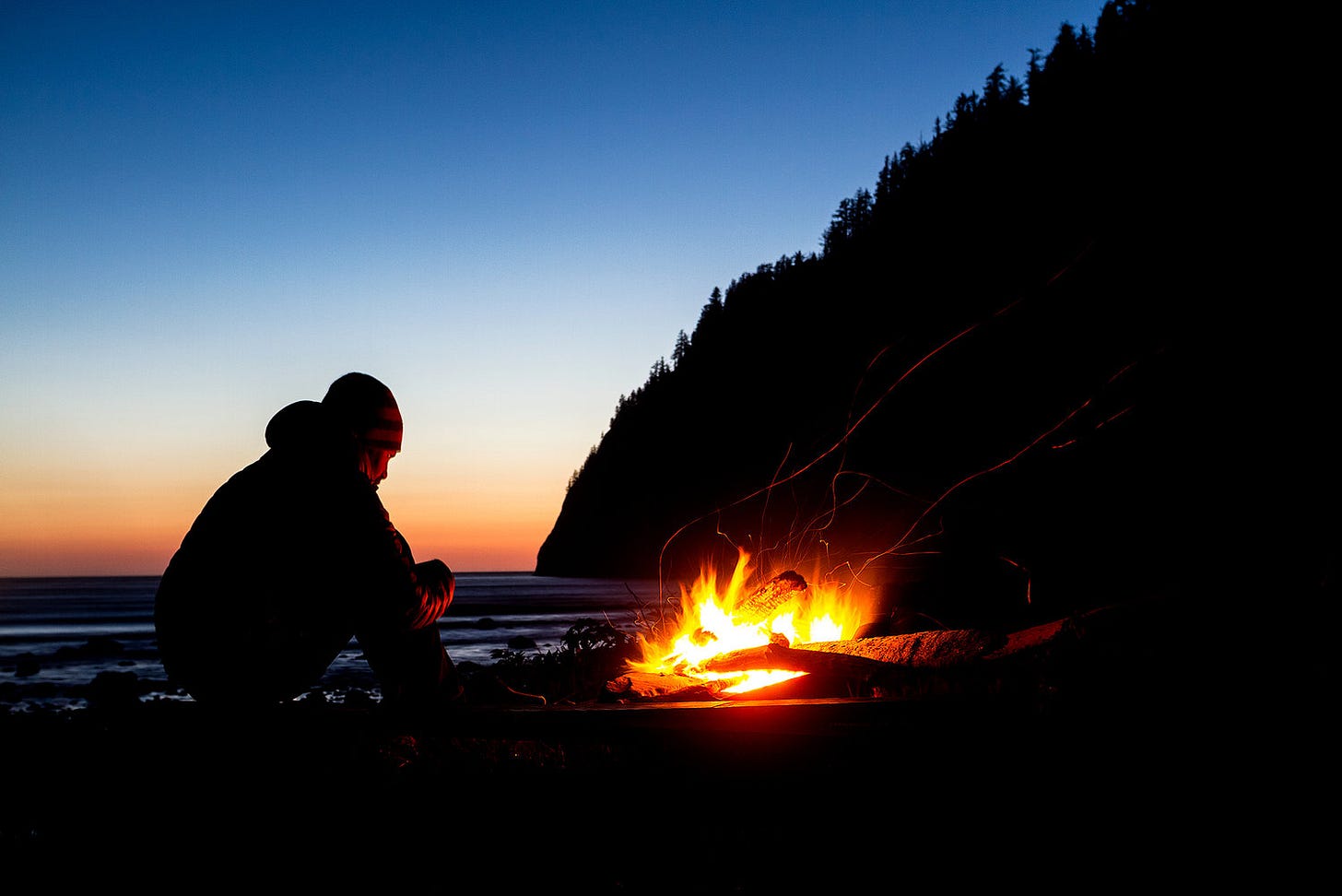
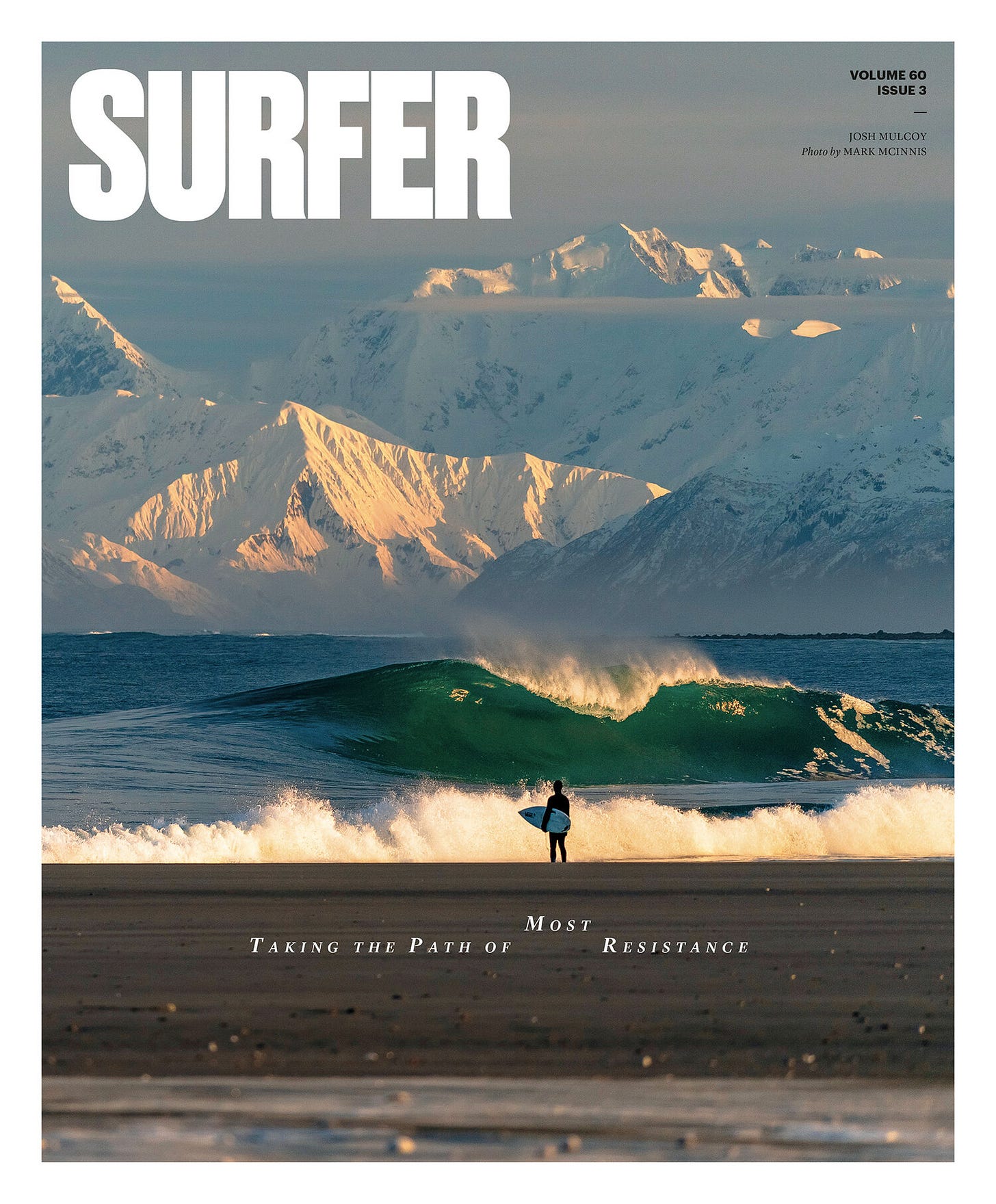
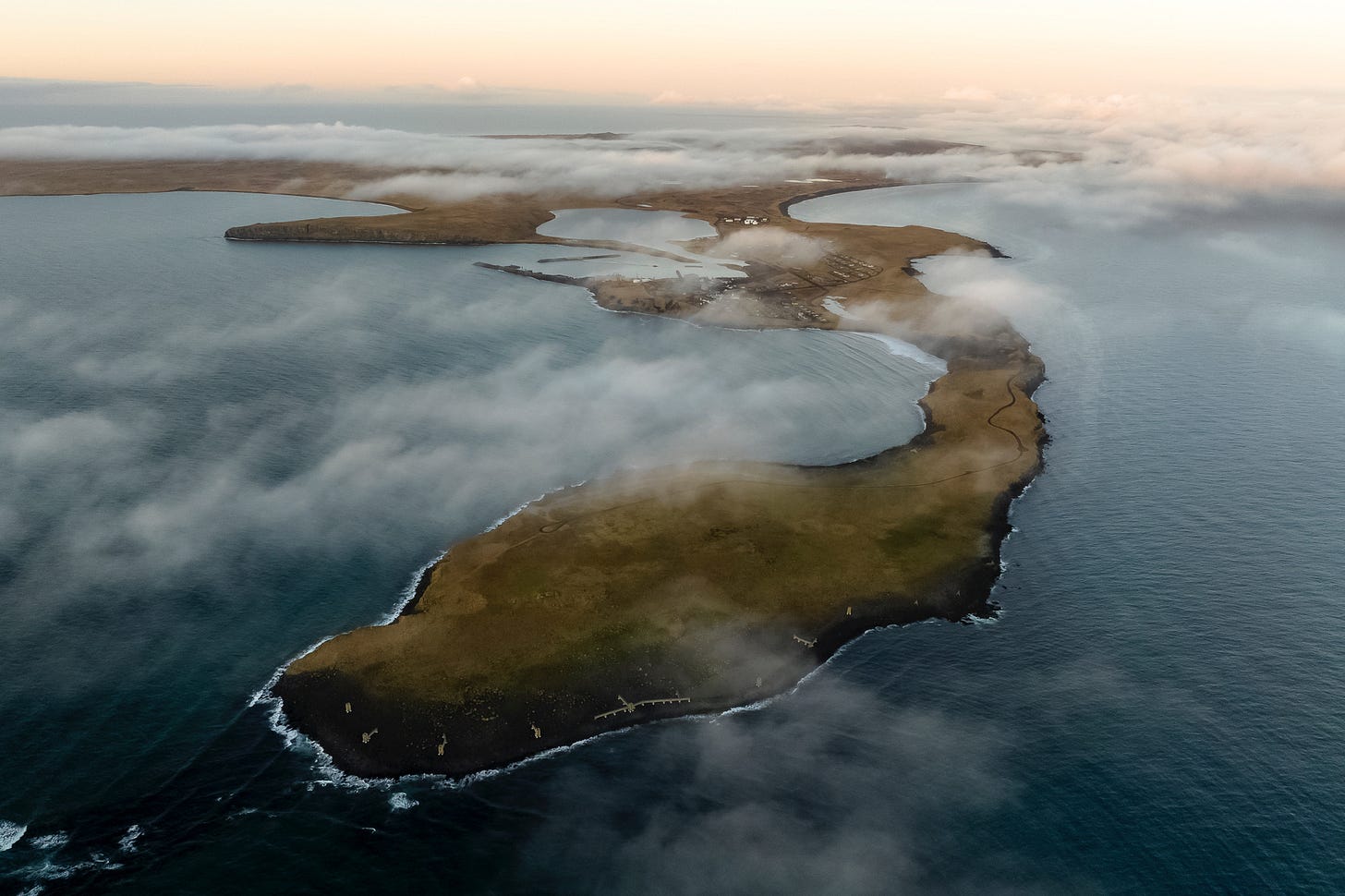
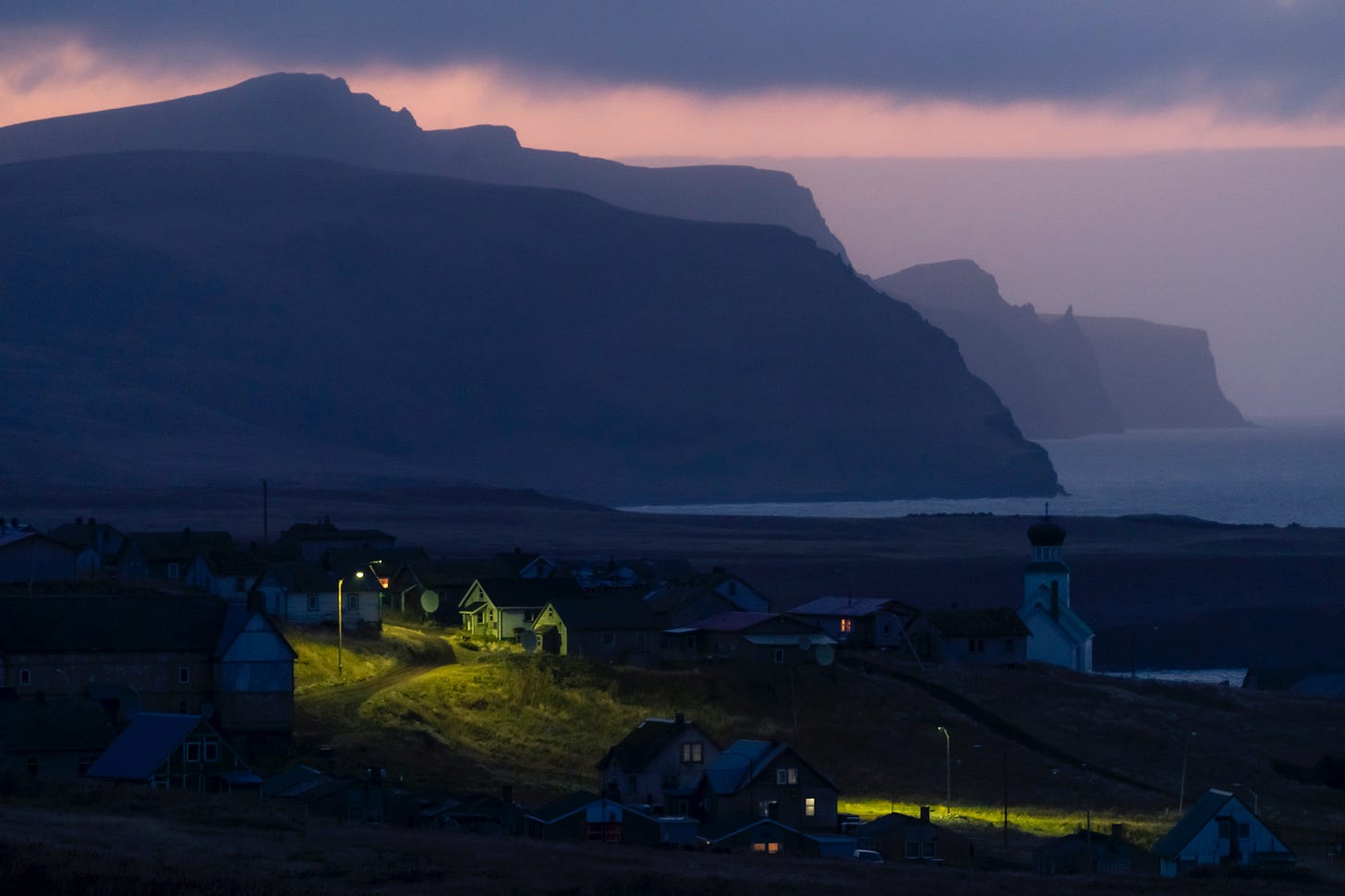
Stunning